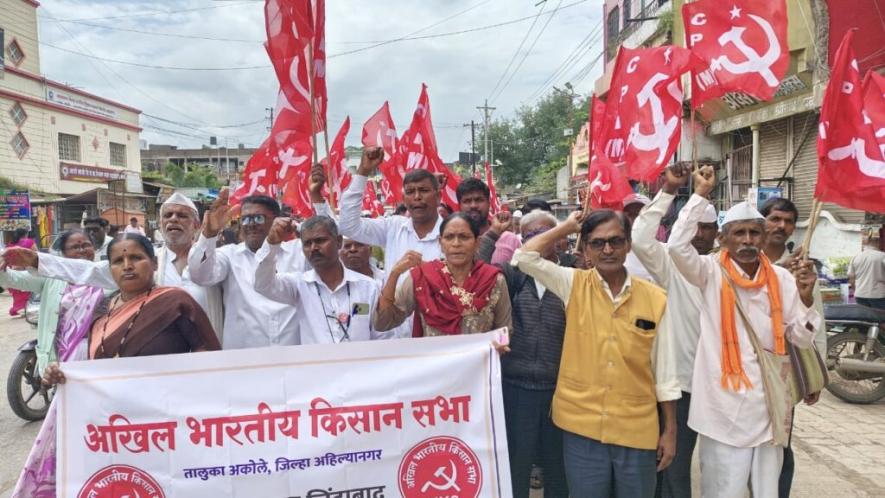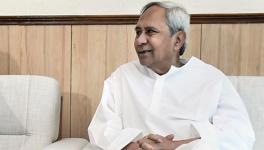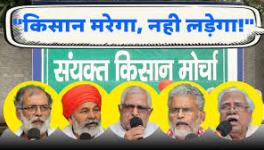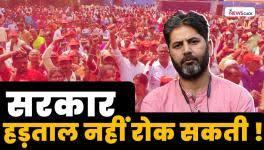Cotton Farmers Protest Tariff Withdrawal, Betrayal by Modi

Farmers participating in a demonstration on September 3, organized by Maharashtra Kisan Sabha condemning the Modi government's suspension of cotton tariff. Photo: AIKS / X
Thousands of cotton farmers in India staged protests across the country between September 1 and 3 to oppose the government’s decision to withdraw tariff on cotton imports. The protest was called by the left-wing All India Kisan Sabha (AIKS) and other constituents of the Samyukta Kisan Morcha (SKM), a collective of farmers’ unions.
The protesting farmers also sent a joint letter to Indian Prime Minister Narendra Modi pressing for their demands which includes increase in the minimum support price of cotton of Rs. 10,075 per quintal (around 114 US dollars), loan waivers to all cotton farmers, and a minimum of Rs. 2.5 million (28,311 US dollars) compensation for the families of the farmers who died by suicide.
The protesters reminded the prime minister of his declaration on both August 7 and August 15 to protect the interests of Indian farmers at any cost and demanded that he live up to that promise.
Speaking during a meeting on August 7, Modi had said that his government is facing pressure from the US and other Western powers to further open up its agricultural sector for trade and investment. Yet he declared that his government would not sacrifice the interests of the nation’s “farmers, dairy farmers and fishermen”, irrespective of the cost.
Modi was referring to the ongoing trade talks with the US. As per media reports, agriculture was the major sticking point in the conclusion of the trade deal between both the countries. It was also reported that US President Donald Trump’s announcement to impose a 50% tariff on all Indian imports was part of the broader pressure campaign to make India open its agricultural market.
Modi reiterated his government’s resolve during his annual independence day speech on August 15. However, within four days of that speech his government issued the notification to withdraw the tariff on cotton imports risking the livelihood of millions of cotton farmers in the country.
The government claimed the move was temporary and will be in application until the end of September. However, despite the protest by farmers’ bodies, the government extended the end date until the end of the year. It is likely that this may be extended further.
Distress among the cotton farmers
“This policy reversal exposes the hollowness of your claim and highlights your government’s willingness to surrender farmers’ interests to the US imperialist pressure,” protesting farmers said to Modi in the open letter.
Farmers claim that since the withdrawal of tariff, “cotton prices have started falling and farmers are facing further distress and indebtedness.” They fear that “the elimination of import duty on cotton will further eliminate the livelihood of” 6 million cotton farmer households across India.
India is among one of the largest cotton producers in the world with over 5.5 million metric ton annual production and more than 6 million farmers directly involved.
The letter to the prime minister also noted that farmers suicide in cotton growing areas of Maharasthra and others is already on rise again with over 767 farmer suicides in just the first three months of the year.
In the last 11 years, since Modi came to power, every day “31 farmers are committing suicide in India” the letter claims.
More than 450,000 farmers have committed suicide in India since 1991 as per the government data.
The farmers’ groups claim that these suicides are result of the neoliberal economic policies pursued by the successive governments in India since the 1990s. These policies have affected the country’s overall agricultural sector which still provides employment to over 40% Indians.
“The burgeoning cost of production and the distress sale of agricultural produce are the reasons behind these ‘manmade tragedies,’ the letter notes, claiming that the neoliberal policies have intensified in India during Modi’s rule despite their devastating repercussions being obvious to everyone.
In the letter, the farmer groups warned the government to fulfil their demands as listed immediately or be ready to face more protests in the coming days. The farmers vowed to mobilize other sections of the society as well in future protests to push for their demands.
Courtesy: Peoples Disaptch
Get the latest reports & analysis with people's perspective on Protests, movements & deep analytical videos, discussions of the current affairs in your Telegram app. Subscribe to NewsClick's Telegram channel & get Real-Time updates on stories, as they get published on our website.
























